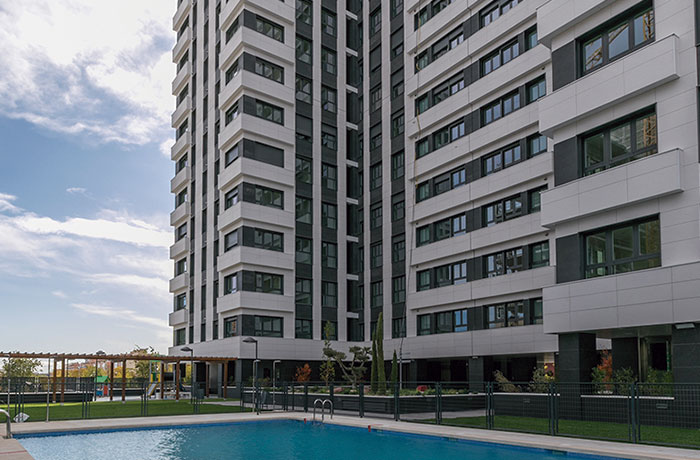Caution, solidarity, empathy and patience, Vía Célere’s recommendations for the lockdown
The lockdown decreed by the government to try to contain the spread of the Covid-19 virus is leading to everyone in Spain spending a lot of time at home, which at times can lead to tension with neighbours and questions about everyday life in the community. To promote safety as well as a healthy and comfortable coexistence for everyone, experts from Vía Célere, specialising in the development, investment and management of real estate assets, have developed the following list of recommendations:
- Maintain the safety measures at all times. It is very common to come across a neighbour on going outside to do some shopping or take the children or pets for a walk. In these encounters, even though they are brief, it is essential to maintain the safety distance and avoid physical contact. In addition, it is very important to maintain hygiene by washing your hands frequently, especially after being outside.
- Use the stairs. Lifts are confined spaces in which there are various points of contact, such as the buttons. It is preferable to avoid them for now, whenever possible, and use the stairs instead. This is also a good way to take some exercise every time we go out, especially from the higher floors.
- Reinforce hygiene in common areas. Especially in areas of movement and physical contact such as stairs, handrails, elevators, intercoms and door knobs.
- Concentrate rubbish collection within a specific timetable: In many communities there is the possibility of leaving rubbish at the entrance at set times, before the containers are taken out to the street. The ideal thing is to take the rubbish out within these times, avoiding having to go out in the street and the bags being a long time in the container and generating unpleasant odours.
- Hold residents’ meetings, even if they are virtual. Although meetings in person are prohibited to avoid the spread of the disease, it is a positive thing to maintain ongoing contact between all neighbours, so that the decisions necessary for maintaining the building can still be made, any questions that may arise can be addressed and any complaints may be aired so that attempts can be made to find a solution to them.
- Review the noise regulations of your community, allow others to enjoy their rest time… but also their leisure time. It is normal for noise from neighbours to be a nuisance, especially when it comes from activities such as exercising or children playing. In this case, it is advisable to review the regulations, which vary depending on the community and the times, and concentrate the noisiest activities in times when they will cause less inconvenience. If a neighbour is disrupting other people’s rest, the preferable thing to do as a first option is to talk to them to try to remedy the situation. If they do not stop after this first attempt, and only if they are repeatedly breaching the regulations, the authorities should be contacted.
- Join in with the clapping… but don’t let it go on too long. The clapping every day at eight o’clock in the evening is a nice way of expressing our thanks to our healthcare workers and the other people who have carried on working during the most complicated times of the disease. It is a good time to connect with your neighbours and get to know them and, sometimes, liven up the evening with a little music. However, to respect those people who prefer to rest, it is advisable to control the duration of this tribute.
- Group activities. If relations with neighbours are smooth and good, group activities can be carried out from the balconies of people’s homes. For example, one landing recreated the introduction of the series “Aquí no hay quien viva” after the clapping. Other options are putting music on so that everyone can dance together. Carrying out group activities can foster a good atmosphere between neighbours and, at the same time, make the lockdown more bearable.
- Solidarity. If there are disabled people or people with reduced mobility in your community, support them in any way you can, always respecting the recommended safety and hygiene measures. Ways in which you can help are by getting their shopping for them or taking their pets for a walk.
- Patience and empathy. Although this situation is inconvenient for everyone, and it may generate some irascibility and difficult situations of coexistence, we have to be patient and remember that we are all in the same situation. We also have to bear in mind that this is temporary and that we will gradually get back to normal. Therefore, we have to be patient and keep our spirits up.


